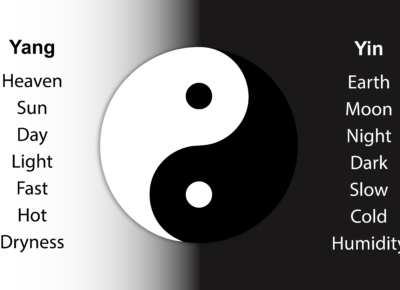Understanding Qi in Chinese Medicine

Qi is what traditional Chinese medicine calls the vital life energy that exists within us. It is the life force that propels and keeps everything inside us alive and in motion.
People often ask: what is Qi? Does it exist inside our bodies or outside? How does it work?
Qi is the Vital Life Energy
Qi is what traditional Chinese medicine calls the vital life energy that exists within us. It is the life force that propels and keeps everything inside us alive and in motion. But it is also a form of energy that exists outside of us. It is at the root of every function in the human body and in the universe.
Yin and Yang Energy
Yin and Yang are generally understood to be the opposite yet complementary natures of energy. But their meaning is more nuanced than that. They are energies that are dependent on the other’s existence for their very own existence. Yin, for instance, describes cooling energy, while Yang describes warming energy. When one is deficient, it means there is relatively too much of the other, requiring an adjustment to both.
When one’s warm energy or Yang Qi is deficient, their cool energy or Yin Qi is in relative excess. They may experience an increased sensation of cold, especially in the hands and feet. Other symptoms include diarrhea, slow metabolism, water retention, low blood pressure and feelings of fatigue. They also tend to have a light-colored, swollen tongue, and a deep and slow pulse. Their facial complexion is often pale, their eyes tend to be puffy or to have bags beneath them, and they also experience nasal congestion with or without a runny nose. Because they are generally sensitive to Cold, Wind, and Damp energy, winter, and fall are tough seasons for them.
When one’s overall energy or overall Qi is deficient, they tend to feel easily tired and experience shortness of breath upon mild exertion. They may also sweat spontaneously; they have a soft, low voice and a puffy, light-red colored tongue with tooth marks along the sides. Their muscles grow loose and weak and their metabolism slows. They catch a cold easily and tend to have a dull facial complexion, dark circles around their eyes, and a puffy face as well. Because they are generally sensitive to Wind, Cold, Damp and Heat energy each of the seasons pose specific challenges for them.
Five Types of External Energy
As I mentioned earlier, Qi exists outside of our bodies too, keeping the life force around us optimally functioning. There are several different types of External energies but the predominant ones occur with the different seasons and various climates. They manifest as Wind, Dampness, Cold, Dryness and Heat. Our body can choose how to interact with outside energies to its benefit. However, when the body’s function is compromised due to internal reasons, or when the outside energy is so strong that it can break down the body’s defenses, these outside forces can either cause or worsen an energetic imbalance inside the body. Essentially, when these External energies permeate the body they have the power to change our own energetic constitution, at least for a little while.
By strategically stimulating select points, acupuncturists can treat illnesses and diseases that are caused by energetic imbalances. Acupuncture and acupressure have greatly helped us refine communications between Internal and External energies, and Chinese herbal medicine is effective in doing so as well.
At Yang Institute, we usually administer acupuncture treatments twice weekly for 6 to 12 weeks. We often add a course of Chinese herbal supplements, suggest a change of lifestyle and diet like foods rich in nutrients known to supplement the Qi of certain organs with problems. Usually, the symptoms will be vastly improved.